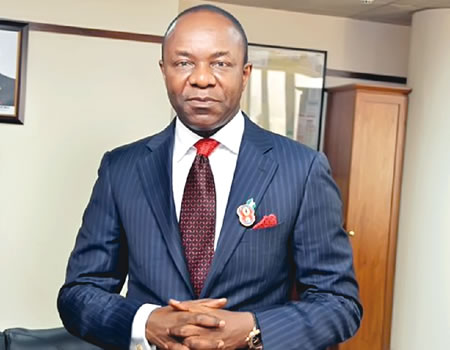Nigeria officially entered into recession last quarter of 2016 and the government has struggled to come up with policies that will take the country out of recession. However, when the President Muhammadu Buhari’s government finally launched the Economic Recovery and Growth Plan (ERGP), experts became divided on the possible effects of the proposed policy. OLATUNDE DODONDAWA looks at how realistic is the target of 2.5million barrels per day (mbpd) by the year 2020.
Continued dependence on crude oil exports as a primary source of foreign exchange earnings makes the Nigerian economy vulnerable to domestic and external shocks from oil and gas sector. Indeed, although the oil and gas sector represents about 10 per cent of total GDP, it still accounts for 94 per cent of export earnings and 62 per cent of government revenues.
One of the strategies adopted in the Economic Recovery and Growth Plan (ERGP) is to urgently increase oil production by restoring oil output to 2.2 mbpd and subsequently reach 2.5 mbpd by the year 2020 to increase earnings and government revenues by an additional N800billion annually and reduce the fiscal deficit and debt service ratios.
Others include boosting pipeline security, engage Niger Delta stakeholders to achieve enduring peace and end attacks on oil facilities. Pass the Petroleum Industry and Governance Bill (PIGB), conclude JV cash calls arrangements and implement a new cost recovery funding mechanism for JVs, revamp local refineries to reduce petroleum product importation by 60 per cent as well as increase electricity generation to 10gigawatts (10000MW).
How did we get to this point?
The current economic hardship is self-inflicting because the federal government brought it upon the masses. Immediately after President Muhammadu Buhari was sworn-in on May 29, 2015, he took several steps that undermined the relative peace that subsists in the Niger Delta region.
Firstly, the President announced he would deal with Niger Delta militants the same way he will deal with the Boko Haram sect members. He frowned at spending huge billions to train ex-militants by stressing that he may review the Amnesty Program and may not include it in the 2016 budget. The third step that finally led to frequent attacks on oil installations was location of military formations in the region and declaring Government Tompolo wanted over his roles in alleged contract scam that rocked the Nigerian Maritime Administration and Safety Agency (NIMASA).
Many, including former British Foreign Secretary, Philip Hammond, kicked against the approach and suggested for a more diplomatic way of handling the Niger Delta challenges because of the significant role the region plays in the economy.
In February, 2016, the Niger Delta Avengers (NDA) launched the first attack on oil installations and sustained such attacks until crude oil production was down to around 800,000 bpd as against 2mbpd prior to the attacks.
The government is now practically begging the leaders of the region and all stakeholders to ensure peace returns to the region. When there is peace, oil installations that were attacked and punctured can befixed and crude oil production will be boosted again. Experts say there are lots of discussions going on behind the scene, they urged the government to do what it can to bring peace and trust to the region in other to also guarantee safety of oil workers on the field.
Experts divided over possibility of attaining 2.5mbpd by 2020
Some experts have expressed divergent opinions on government’s plan to increase oil production from 2.2 to 2.5 mbpd by 2020 under the ERGP. The experts, who spoke in separate interviews with the Nigerian Tribune at the weekend unanimously, agreed that the government needs to formulate policy that will boost reserves, increase oil and gas exploration activities and consequently increasing daily crude oil production and exports.
According to the Managing Director/CEO, Royal Niger Emerging Technologies Limited, Anthony Okolo, “the government must check how the multinationals are running our oil sector. They are running it for their own gain and not for ours. The regulation is so poor that they are getting away with those things they won’t ordinarily do in their countries.
“Nigeria’s installed capacity today is about 3.4mbpd. All the plants and installations that were built have an installed capacity of 3.4mbpd. So, if we want to do 2.5mbpd is not hard at all, it is the will to do it that is important. You need to run those plants efficiently, and all the government is right to have taken this decision to target 2.5mbpd.”
He said the first thing to do is provide enabling legal and fiscal framework for the investors to work. “Firstly, non passage of the Petroleum Industry Bill (PIB) is making it very difficult for any new investor to come and invest in the oil and gas sector. If we look at the installed capacity, there is need to upgrade them and make them run efficiently, we will have a hard time bringing in fresh funds to finance these projects because nobody knows under which new terms they are investing.
“The IOCs whose licenses will be running out between now and 2019 don’t know the new terms under which they are going to renew their licenses. So, they are not going to be quick to sanction new projects. It’s not that they won’t do it; they will but won’t be quick to sanction them. The non passage of the PIB is still hurting the sector.
It is not the PIB that is the major problem, but because the government is yet to assure that ‘we are passing the PIB, or we are passing this aspect of the bill which will be under new title.’
“All investors need is clarity of purpose. They want to know that they are coming into a market and when they come, they want to be sure thatwhen they come with say $10 investment, they are guaranteed that they will leave the market with the same law that guarantee their $10 investment and won’t be negatively impacted by new laws,” he said.
He said another important thing the government must do is to ensure peace in the Niger Delta region. “You must build confidence among the people of the region and let them trust you. For instance, while attempting to design a policy objective, there some intervening factors thatslow down the process along the line. Like the Ogoni land clean-up. Federal Government should have undergone the behind the scene steps before coming out to flag-off the clean up process rather than flagging it up first, then later began to discuss how to set up machineries in motion on how the process will begin.
“Six month after the ground-breaking, nothing has physical has been done and the people are now doubting government’s commitment to the clean up exercise. Although, I know there are lots of work going on behind the scene, but the common man is not seeing it and now doubts the entire process. The government should take the lead and do not wait for the IOCs to take the lead.
“So if we want to really achieve the target of 2.5mbpd as set by the government, we should take our country back from the foreign companies and Nigerians who do not want progress for this country. If we don’t take it back, there is nothing we can plan in this country that will work. The common man must take his country back. Our country is different form their country,” he concluded.
On his part, Saka Matemilola, Nigerian Council Chairman, Society of Petroleum Engineers (SPE), said that the projections of ERGP are achievable. He said that one of the key priority areas in the ERGP road map for the oil industry was the plan to increase local refineries’ production capacity by modular refineries and co-location.
‘‘Perhaps, the most important part of the reforms in the midstream and downstream sub-sectors is in creating a profitable products-to-market system for Nigeria and removing hindrances and bottlenecks through incentives and regulatory frameworks.
“The current state of the country’s supply and distribution systems are characterised by poor storage facilities, inadequate supply, pipeline vandalism, poor products management and accountability. To correct the imbalance, the country needed to build refineries and run them as profit centres that would purchase crude at international prices and deliver their products at export parity prices,” he said.
Abiodun Adesanya, President of Nigerian Association of Petroleum Explorationists (NAPE), said that government’s plan to increase crude oil production to 2.5 mbpd by 2020 could be achieved if the ERGP could be well implemented.
Adesanya said government’s target to increase crude oil reserves to 40 billion barrels and 2.5mbpd by the year 2020 could be achieved. According to him, “Nigerian oil and gas industry is currently experiencing declining reserves owing to reduced exploration activities due to militancy. Successful exploration and development of new oil fields would require the use of novel integrated technologies.”
Adesanya, who is also the Managing Director, Degeconek Nigeria Ltd., said that government was committed to meeting the 40 billion barrels oil reserves target. He, however, decried the spate of crude oil theft and pipeline vandalism in the country.
Dr Mayowa Afe, the President of Oil and Gas Trainers’ Association of Nigeria (OGTAN), commended the government for finally giving the country an economic plan. Afe said that the plan was timely and its intentions noble.
According to him, oil production has started to increase due to ongoing dialogue instituted by government to resolve challenges in the Niger Delta region. “Nigeria needs a plan that will boost productivity, get the youths engaged and ensure economic sustainability,’’ he said.
He faulted the country’s over-dependence on oil, saying the fall in global oil prices had brought the country’s economy to its knees. “Nigeria needed to look beyond crude oil and bring more foreign investments like what was happening in India and China. The greatest unease about the plan is the mindset that government will do everything in terms of providing infrastructure. Nigeria must open up infrastructure currently under government monopoly so that foreign investments can come in,” he said.
Conclusion
There is need for the federal government to demonstrate political will to achieve the target. For instance, when Minister of State for Petroleum Resources, Dr. Ibe Kachikwu, introduced Price Modulation last year, it was meant to be reviewed quarterly. Stakeholders welcomed the development and believed that the downstream sector has been freed from the shackles of marketers who are benefiting from subsidy regime.
Investors like Captain Emmanuel Iheanacho, in January 2017, promoted 20,000 barrels per day modular refinery so as to boost the nation’s refining capacity. Iheanacho, who is the Chairman of Integrated Oil and Gas Limited urged the government to provide enabling environment for entrepreneurs.
Now, the project may have been frustrated because the Price Modulation mechanism is to be reviewed quarterly to reflect the fair market price of premium motor spirit (PMS) otherwise called petrol. Until the downstream sector is fully deregulated, PIB is passed and peace is guaranteed in the Niger Delta region, the ERGP will always go the way of previous proposed economic reforms and nothing will change.
WATCH TOP VIDEOS FROM NIGERIAN TRIBUNE TV
- Relationship Hangout: Public vs Private Proposals – Which Truly Wins in Love?
- “No” Is a Complete Sentence: Why You Should Stop Feeling Guilty
- Relationship Hangout: Friendship Talk 2025 – How to Be a Good Friend & Big Questions on Friendship
- Police Overpower Armed Robbers in Ibadan After Fierce Struggle






